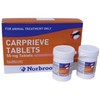Carprieve
Carprieve tablets are anti inflammatory tablets for dogs. Carprieve tablets are available in two strengths with the following active composition: Carprieve 50 mg tablets containing 50mg of Carprofen and Carprieve 100 mg tablets containing 100mg of Carprofen.
Carprieve Norocarp Tablet 50mg
£0.28Carprieve (Norocarp) is indicated for analgesia and reduction of chronic inflammation, for example in degenerative joint disease, in dogs. The tablets can also be used in the management of...[More info]
Carprieve Norocarp Tablet 20mg
£0.19Carprieve (Norocarp) is indicated for analgesia and reduction of chronic inflammation, for example in degenerative joint disease, in dogs. The tablets can also be used in the management of...[More info]
Carprieve Norocarp Tablet 100mg
£0.60Carprieve (Norocarp) is indicated for analgesia and reduction of chronic inflammation, for example in degenerative joint disease, in dogs. The tablets can also be used in the management of...[More info]
Carprieve tablets are available in two strengths with the following active composition; 50 mg Carprofen and 100 mg Carprofen as white/off white circular tablet for oral administration.
For analgesia and reduction of chronic inflammation, for example in degenerative joint disease, in dogs. Carprieve tablets can also be used in the management of post-operative pain.
An initial dose of 2 to 4 mg carprofen/kg bodyweight/day is recommended to be given in two equally divided doses. The dose may be reduced to 2 mg carprofen/kg bodyweight/day administered as a single daily dose after 7 days, subject to clinical response.
Duration of treatment will be dependent upon the response seen. Long term treatment should be under regular veterinary supervision. To extend analgesic cover post-operatively, parenteral administration of carprofen, may be followed with Carprieve Tablets.
Contra Indications: The use of carprieve tablets is contraindicated in the cat, and the inadvertent administration of oral carprofen tablets may induce life-threatening conditions in this species. Do not exceed the stated dose. Do not administer NSAIDs concurrently or within 24 hours of each other. Some NSAIDs may be highly bound to plasma proteins and compete with other highly bound drugs, which can lead to toxic effects. Do not use in dogs suffering from cardiac, hepatic or renal disease, where there is a possibility of gastrointestinal ulceration or bleeding, or where there is evidence of a blood dyscrasia or hypersensitivity to the product. Use in dogs less than 6 weeks of age, or in aged animals, may involve additional risk. If such use cannot be avoided, such dogs may require a reduced dosage and careful clinical management. Avoid use in any dehydrated, hypovolaemic or hypotensive dog, as there is a potential risk of increased renal toxicity. Concurrent administration of potential nephrotoxic drugs should be avoided. In the absence of any specific studies in pregnant bitches, such use is not indicated. NSAIDs can cause inhibition of phagocytosis and hence in the treatment of inflammatory conditions associated with bacterial infection, appropriate concurrent antimicrobial therapy should be instigated.
